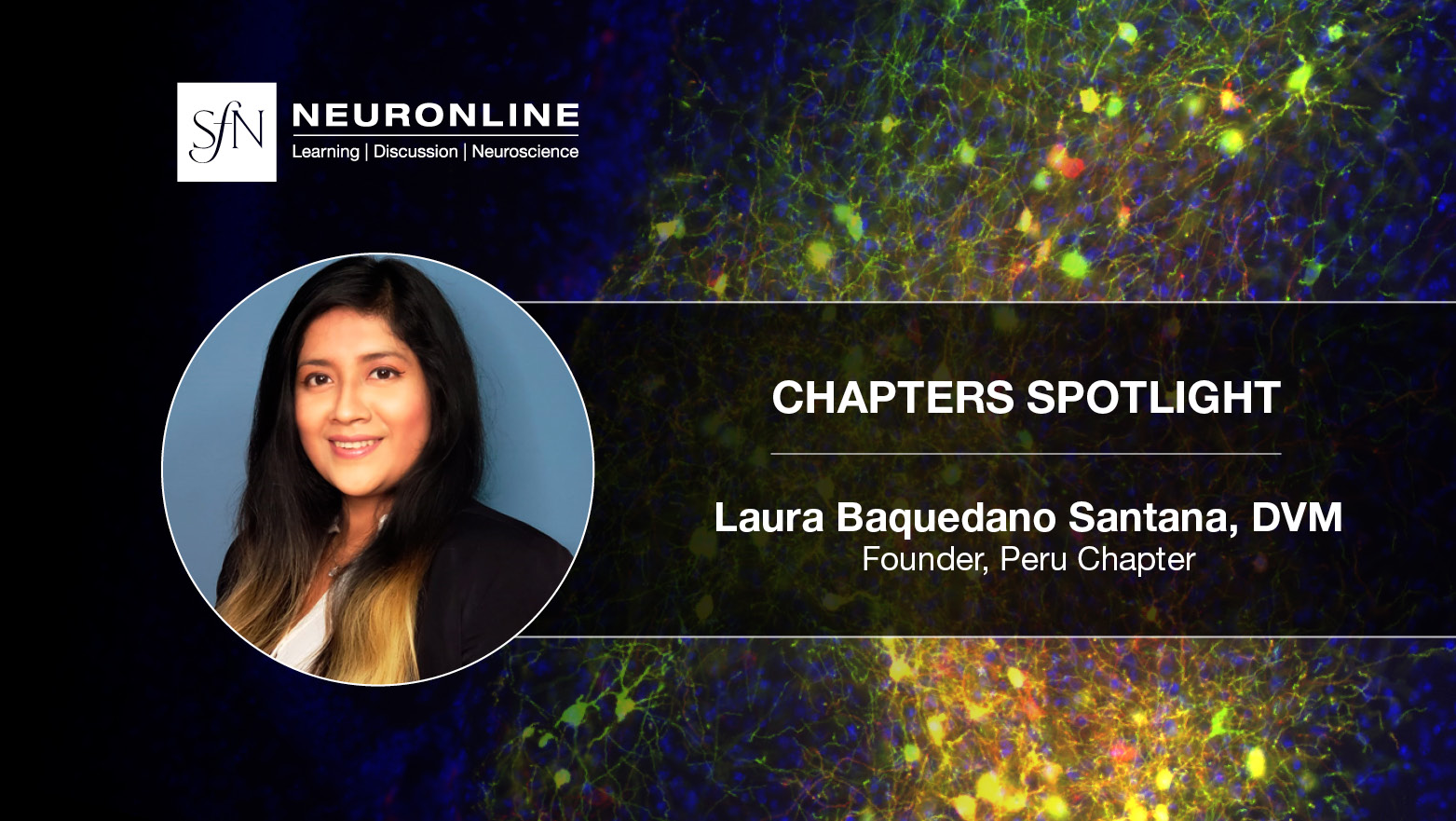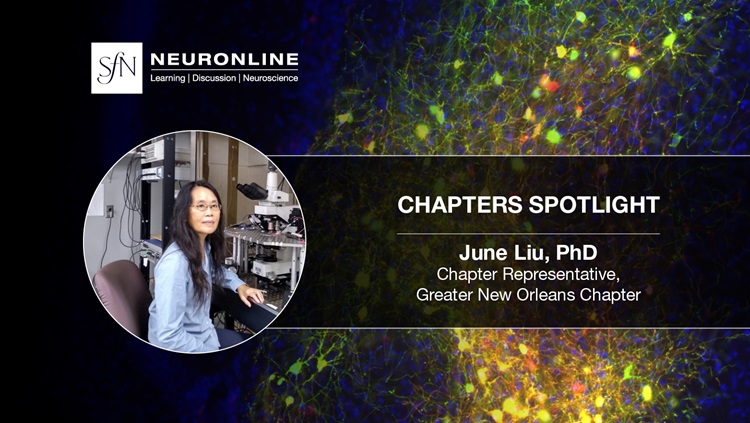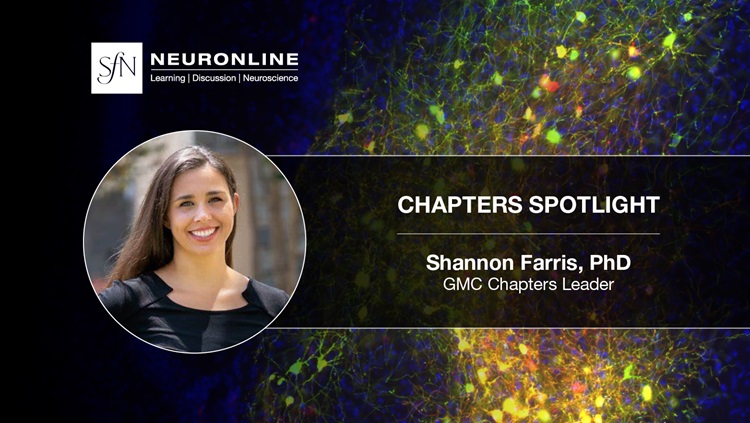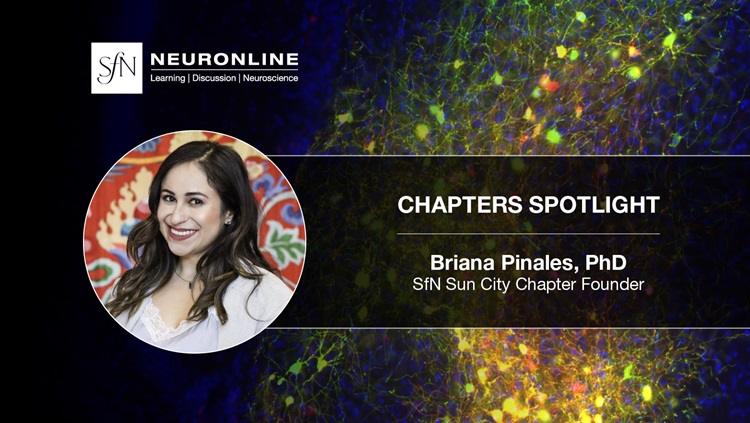Strengthening Neuroscience Through Community: Laura Baquedano Santana on Founding SfN’s Peru Chapter
- Featured in:
- SfN Chapter Resources

In this Chapters Spotlight, learn more about Laura Baquedano Santana, founder of SfN's Peru Chapter, and what inspired her to start the only chapter in Peru during the Covid-19 pandemic, how her chapter is working to increase awareness of neuroscience across the country, and how her personal background shapes how she leads the chapter. Read her story and explore SfN’s local chapters here.
What drew you to volunteer for the Chapters Subcommittee of the GMC?
I felt an urgent need to create a space in Peru where students, researchers, and professionals could learn more about neuroscience, develop their skills, and collaborate. At that time, there was no active chapter in the country, nor any network that organized regular activities or highlighted the importance of this field. I decided to found the Peru chapter during the pandemic, driven by the need to address mental health — a critical and under-discussed issue in Peru — and by my belief that neuroscience could offer valuable tools for understanding and promoting well-being.
However, while I initiated the project, I did not do it alone. The chapter became a reality thanks to the support of an initial group of over ten people, including undergraduate and graduate students, early-career researchers, and professionals such as physicians who believed in the idea from the start. We also received key support from senior researchers in Latin America — from countries like Panama, Colombia, Uruguay, Mexico, Venezuela, and Argentina — who generously gave us their vote of confidence, validated our mission, and helped us integrate into the broader regional network. This experience of collective creation and international solidarity shaped my vision of scientific work as something to be built through collaboration, not individualism.
What value do you find in participating in local chapters?
Local chapters are unique spaces to build community, generate interdisciplinary networks, and promote science from an inclusive and accessible perspective. For me, being part of a chapter has meant much more than organizing events — it has been a school of leadership, collaboration, and creativity.
Volunteering in a chapter also helps you develop skills that are not taught at university or in most professional settings. You learn to manage teams, communicate science effectively, secure resources, build alliances, resolve conflict, and lead with purpose. But most importantly, you learn to give — to contribute, to build something meaningful without expecting anything in return. That deep sense of service and collective growth is one of the most transformative aspects of this experience. I believe this is what truly gives life to a chapter: the genuine commitment of its members to leave a mark.
How has being involved in your chapter expanded your views on the field of neuroscience?
Being part of the chapter has shown me how broad, rich, and interdisciplinary neuroscience really is. I’ve learned that the field is not built solely in labs or clinics, but also through education, technology, public health, engineering, the arts, and even philosophy. I’ve met people from diverse backgrounds who bring unique perspectives, and it has become clear to me that the future of neuroscience depends on embracing this diversity.
In Peru, neuroscience is often viewed as something exclusive to physicians. There’s little awareness that it is, in fact, an interdisciplinary field by nature, and that anyone – whether from psychology, engineering, education, biology, or other disciplines – can contribute to the science of the brain. That realization has deeply transformed how I see the field, and it’s something I hope to convey through the chapter: being a neuroscientist is not a title, but a practice rooted in rigorous study from any domain. Anyone who wants to be part of it can be, and should be, welcomed.
What is the most memorable experience with your chapter?
There have been many, but a few stand out in particular. One was organizing the first national neuroscience congress in my region, led entirely by students and featuring speakers from across Latin America. Another was facilitating a discussion group at the Chapters Workshop during the SfN's annual meeting – it was inspiring to share experiences with leaders from around the world and to discover that, despite our different contexts, we share similar challenges and hopes.
Another profoundly moving experience was taking neuroscience workshops to elementary schools and watching 7- and 8-year-olds build 3D neurons, get excited about the senses, emotions, and how the brain works. Seeing them engage, ask questions, and imagine freely reminded me of the power of early science education. Every activity we’ve organized has been unique, made possible by the commitment of our volunteers and the support of schools and universities willing to open their doors.
And finally, one unforgettable moment was hosting our Second International Neuroscience Congress in the Congress of the Republic of Peru. It was not only a milestone because of the symbolic venue, but also because it was the first time the Peru Chapter team met in person. After nearly two years of working virtually due to the pandemic, we finally saw each other face to face. Our first congress had been online — so this second one was not only an academic achievement, but a human reunion that meant a lot to all of us.
How would you like to see your chapter evolve over the next few years?
I hope to see the chapter grow into a sustainable space for scientific training, youth leadership, and interdisciplinary collaboration. I envision it having a stronger presence in public policy and science education, especially in underserved communities, while consolidating long-term mentorship programs, international exchange opportunities, and vibrant research networks.
Over the past five years, we’ve proudly seen many of our original volunteers go on to form their own study circles, research groups, and science clubs. Some have organized their own events, others have gone abroad to pursue science degrees, and many are now engaged in neuroscience research. It is incredibly rewarding to see the seeds we planted continue to grow.
I want our chapter to not only foster outreach and education, but to actively support the formation of new scientists – not just technically skilled researchers, but people who are also committed to sharing, teaching, and communicating science. Science isn’t meant to serve only the individual; it belongs to society. We need to cultivate a culture of neuroscience that is practiced with ethics, compassion, and a spirit of generosity.
This conviction also comes from my own story. I come from a family with limited resources; my parents only finished high school, and for many years I dreamed of doing science without knowing if it would ever be possible. I know what it feels like to lack access, role models, or networks. That’s why I believe so strongly in chapters: they can be the first bridge for someone who, like me, wants to pursue science but needs a community to help them rise. And that community must be built on commitment, generosity, and deep respect for diverse paths.
What is one piece of advice you could share with other chapter leaders/members to bolster chapter membership/enable long term success of their organization?
Listen to your members. Every chapter should be built around the needs, dreams, and talents of its community. Make space for others to lead, trust in young people, and never underestimate the power of consistency. Small, steady actions with clear purpose are what build lasting legacies.
This is a team effort. As leaders, we must be honest, transparent, willing to learn alongside others, and unafraid to show our own limitations. As a woman, my path has not always been easy. But I’ve been fortunate to have friends who shared this vision: to create a space where neuroscience could be done with passion, empathy, and a genuine sense of service — not ego or personal gain. Surrounding yourself with people who not only know a lot, but who are generous and kind, is essential for building a chapter that thrives.
Chapters that flourish are those driven by a shared purpose, not individual recognition. And the best legacy we can leave as leaders is to empower those who will surpass us.








